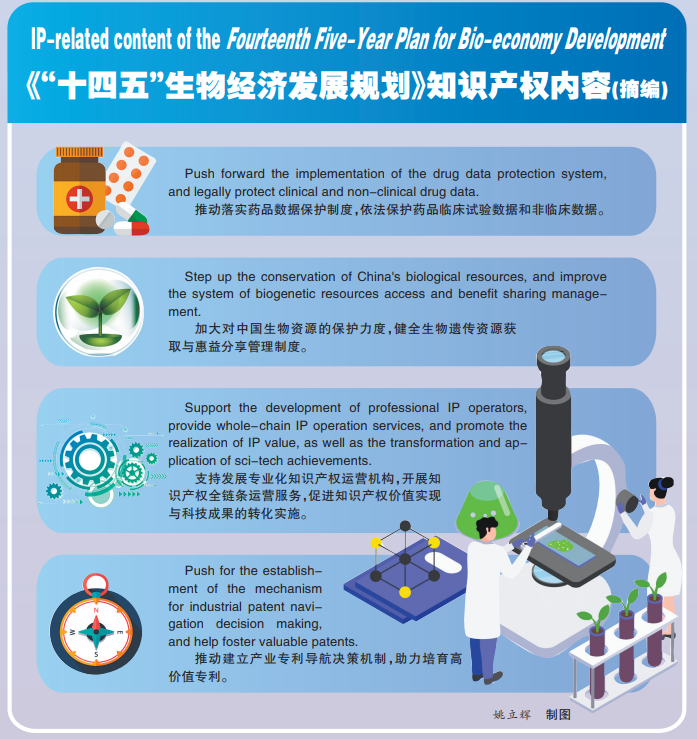IP Boosts Bio-Economy Development in China
Bio-economy is a new economy based on the development, progress and popularization of life science and biotechnologies, as well as an integral part of the national economy. Recent years have seen the continuous expansion of the industrial scale of China's bio-economy, as well as China's major breakthroughs and innovations in basic biological research.
To keep pace with the accelerated evolution of global biotechnologies, and realize sci-tech self-reliance and self-improvement at higher levels, China released the Fourteenth Five-Year Plan for Bio-economy Development in May 2022, proposing to build national biotech strategic strengths and break the bottlenecks of bio-economy development in an accelerated manner, thus realizing sci-tech self-reliance and self-improvement. Notably, traditional Chinese medicine (TCM) is an important part of China's bio-economy, attested by the issuance of the Fourteenth Five-Year Plan for the Development of Traditional Chinese Medicine in March 2022 with an aim to further empower bio-economy development.
"The innovative development of bio-economy has been inseparable from institutional guarantee for intellectual property (IP) and opened up a new path for the improvement of the IP governance system," said Song Wei, Executive Director of Intellectual Property Research Institute, University of Science and Technology of China.
The Fourteenth Five-Year Plan for Bio-economy Development stresses strengthening of IP protection and grooming of valuable patents to promote the realization of IP value, as well as the transformation and application of sci-tech achievements.
Strengthening independent innovation, breaking the bottlenecks of biotech development
The development and progress of life science and biotechnologies is vital to bio-economy development. China is active in a wide range of innovation fields. China led the world in patent filings in biological breeding as of late September 2021. According to the Patent Landscape Report on COVID-19-Related Vaccines and Therapeutics released by the World Intellectual Property Organization(WIPO) in March 2022, China is currently the leading origin of patent filings related to COVID-19 vaccines and therapeutics. All these achievements demonstrate China's accelerated efforts in realizing sci-tech self-reliance and self-improvement in bio-economy at higher levels.
"Innovation is essential to the development and future of bio-economy," said Wang Xiang, Deputy Director General of Department of Innovation and High-Tech Development, National Development and Reform Commission. "Despite remarkable achievements have been achieving in bio-economy innovation, China is still facing a lot of challenges and yet to improve technologies in key fields and links." Therefore, the Fourteenth Five-Year Plan for Bio-economy Development puts innovation front and center in bio-economy development, stressing that we should speed up biotech innovation and industrialization, and break development bottlenecks in an accelerated manner, so as to realize self-reliance and self-improvement in biotechnologies.
Innovation is also the core principle of the Fourteenth Five-Year Plan for the Development of Traditional Chinese Medicine. The Plan clearly states that we should use modern technologies and methods, explore the essence of TCM, and develop new features and advantages in innovations, so as to promote the featured development of TCM.
Promoting chain integration, expanding the industrial scale of bio-economy
How to speed up basic research and industrialization of innovative technologies in that period to boost the high-level innovative development of biotechnologies? IP is indispensable.
To accelerate the industrialization of China's synthetic bio-manufacturing, the China National Intellectual Property Administration(CNIPA) officially approved the establishment of the National Intellectual Property Operation Center for Synthetic Biology in April 2022. Relying on the resources of Tianjin Institute of Industrial Biotechnology, Chinese Academy of Sciences, the center has built the "Patent Pool for Synthetic Biology Enabling Technologies", the "Patent Pool for Underlying Technologies of Corynebacterium Glutamicum" and other patent pools, kept exploring high-level underlying patented technologies, helped improve the R&D capacity of China's synthetic biotechnologies, and set up platforms to duly release patent portfolios, so as to promote the marketization and industrialization of synthetic biotechnologies.
Patent navigation projects also play an important role in the industrialization of innovations in key fields. In recent years, with a focus on biomedicine and bio-health, biological breeding and other industrial fields, areas like Shanghai, Jiangsu and Heilongjiang have deployed patent navigation system, and analyzed regional biotech patent information to identify the competitive edge of local patented technologies, thereby providing guidance on the choice of technical paths and the transformation of the industrial structure. The output value of Shanghai's and Jiangsu's biomedical industry topped 700 billion yuan and 400 billion yuan in 2021 respectively, showing significant economic benefits generated by biological patents.
"The innovation chain of bio-economy is long-from basic research on synthetic biology and brain science, to technical improvement in genetic sequencing and biological detection, to product R&D and health services, all the links of the innovation chain are very important," said Song. Continuing to promote the integration of IP creation, application, protection, management and service with bio-economy innovation, and improving the mechanism for whole-chain management of bio-economy IP will provide stronger support for bio-economy development.

Source:China IP News
 商专知识产权
商专知识产权